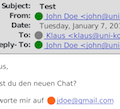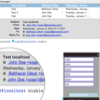General audience texts
Besides the scholarly publications listed below, I have written many texts in English and German. My more notable German texts appeared by DNIP.ch. I also maintain document collections intended for a broad audience:
Scholarly publications
Up-to-date citation counts (provided by Google Scholar). List of patents granted.
2015
Klaus Herberth; Daniel Scharon; Matthias Fratz; Marcel Waldvogel
JSXC: Adding Encrypted Chat with 3 Lines of Code Proceedings Article
In: NetSys 2015, Gesellschaft für Informatik, 2015.
Abstract | BibTeX | Tags: Security, XMPP | Links:
@inproceedings{Herberth2015JSXC,
title = {JSXC: Adding Encrypted Chat with 3 Lines of Code},
author = {Klaus Herberth and Daniel Scharon and Matthias Fratz and Marcel Waldvogel},
url = {https://netfuture.ch/wp-content/uploads/2014/12/herberth2015jsxc.pdf
https://netfuture.ch/wp-content/uploads/2015/02/jsxc-poster.pdf},
year = {2015},
date = {2015-03-10},
urldate = {1000-01-01},
booktitle = {NetSys 2015},
publisher = {Gesellschaft für Informatik},
abstract = {If it is not in the web, it does not exist. However, most of our current arsenal of web services are provided for free by large international corporations – free as in targeted advertising. More privacy-aware self-hosted alternatives frequently lack the feature set of their commercial rivals, leaving users to decide between privacy and functionality. Therefore, we present WISEchat (Web-Integrated Secure Enhanced Chat), our concept for enhancing practical security for web-based chat, as well as an implementation, the JavaScript XMPP Client (JSXC). By design, JSXC can be easily and painlessly integrated into existing web apps to equip them with encrypted chat capabilities, making them more attractive and thus more frequently providing a secure alternative as the most functional and convenient alternative.},
keywords = {Security, XMPP},
pubstate = {published},
tppubtype = {inproceedings}
}

2014
Marcel Waldvogel; Klaus Herberth; Daniel Scharon
Chat in Forschung und Lehre? Sicher! Journal Article
In: DFN-Mitteilungen, no. 86, pp. 38-41, 2014, ISSN: 0177-6894.
Abstract | BibTeX | Tags: Federated Services, Privacy, Security, Social Networks, Video Chat, Web Applications, XMPP | Links:
@article{Waldvogel2014Chat,
title = {Chat in Forschung und Lehre? Sicher!},
author = {Marcel Waldvogel and Klaus Herberth and Daniel Scharon},
url = {https://netfuture.ch/wp-content/uploads/2014/05/Waldvogel2014Chat.pdf
https://www.dfn.de/publikationen/dfnmitteilungen/},
issn = {0177-6894},
year = {2014},
date = {2014-05-23},
urldate = {1000-01-01},
journal = {DFN-Mitteilungen},
number = {86},
pages = {38-41},
abstract = {Instant Messaging, Audio- und Videoanrufe, kurz Chat, ist aus unserem täglichen Leben nicht mehr wegzudenken. Die meisten nutzen dafür geschlossene Systeme, die für den Privatgebrauch bequem sind, für den dienstlichen Einsatz in Forschung und Lehre aber an Datenschutz und Privatsphäre scheitern. Das muss nicht so sein: Auf Basis des offenen, föderierten Extensible Messaging and Presence Protocols (XMPP) bietet WISEchat webbasiert und -integriert die Sicherheit, den Komfort und die Erweiterbarkeit, die eine moderne Hochschule braucht. Die Hintergründe, Vorteile und Zukunftssicherheit erläutern wir anhand einiger konkreter Beispiele.},
keywords = {Federated Services, Privacy, Security, Social Networks, Video Chat, Web Applications, XMPP},
pubstate = {published},
tppubtype = {article}
}

Klaus Herberth; Daniel Kaiser; Daniel Scharon; Marcel Waldvogel
Interaktive Webseiten für effiziente Kooperation auf Basis offener Standards Technical Report
University of Konstanz no. KN-2014-DiSy-002, 2014.
Abstract | BibTeX | Tags: Collaboration, Privacy, Security, Social Networks, Video Chat, Web Applications, XMPP | Links:
@techreport{herberth14interaktive,
title = {Interaktive Webseiten für effiziente Kooperation auf Basis offener Standards},
author = {Klaus Herberth and Daniel Kaiser and Daniel Scharon and Marcel Waldvogel},
url = {https://netfuture.ch/wp-content/uploads/2014/01/herberth14interaktive.pdf},
year = {2014},
date = {2014-01-18},
urldate = {1000-01-01},
number = {KN-2014-DiSy-002},
institution = {University of Konstanz},
abstract = {Homepages von Forschern, Informationsseiten der Verwaltung, Support- und Beratungsseiten, Webmail oder sonstige Groupware begleiten uns bei der täglichen Arbeit im akademischen Umfeld. Unmittelbare Rückfragen zu den Inhalten oder Interaktionen sind jedoch weiterhin nicht möglich; eine Integration von Direktkontakten wäre häufig angenehm und hilfreich. Swoosch, unsere Javascript-Bibliothek auf Basis der offenen Standards XMPP, HTML5 und WebRTC, bietet hier Abhilfe. Auf einfachste Weise lassen sich so bestehende Webseiten und -anwendungen transparent um Funktionen für Instant Messaging inklusive Videokonferenz erweitern und neue Beratungs- und Kommunikationskanäle eröffnen, bei denen die Privatsphäre durch Ende-zu-Ende-Verschlüsselung gesichert ist. Die Erfahrungen in den Testinstallationen zeigten nahtlose Integration, niedrige Eintrittsschwelle, Geschwindigkeit und Benutzerfreundlichkeit. Durch die inhärente Föderation von XMPP ist der Dienst auch über die Organisationsgrenzen hinaus einsetzbar. Dank seiner offenen Standards ist Swoosch beinahe beliebig integrier- und erweiterbar.},
keywords = {Collaboration, Privacy, Security, Social Networks, Video Chat, Web Applications, XMPP},
pubstate = {published},
tppubtype = {techreport}
}


